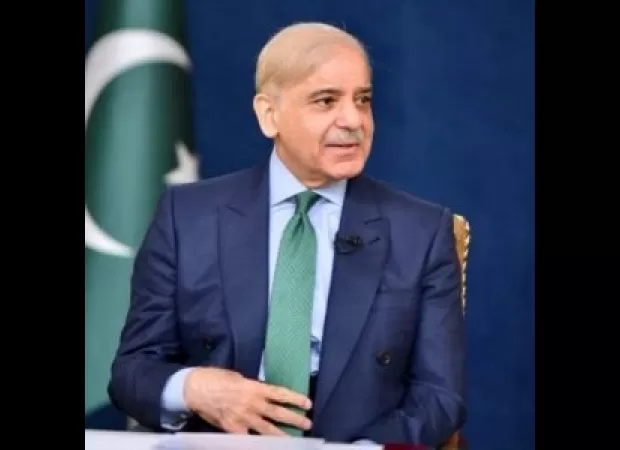Pakistan's Prime Minister will travel to China to plan for mutual development and launch the second phase of the China-Pakistan Economic Corridor.
Pakistan PM Shehbaz Sharif to visit China for 5 days, discussing strengthening ties with President Xi and enhancing cooperation through the China-Pakistan Economic Corridor.

Pakistan's Prime Minister, Shehbaz Sharif, is set to embark on a five-day visit to China on Tuesday. The purpose of the trip is to strengthen the already strong bilateral ties between the two countries, as they work together on the multi-billion dollar China-Pakistan Economic Corridor (CPEC).
According to Pakistan's Foreign Office spokesperson, Mumtaz Zahra Baloch, the visit is a result of an invitation by Chinese President Xi Jinping. During the visit, both sides will discuss ways to enhance cooperation under the CPEC project, with a focus on launching the project's second phase.
The CPEC was initiated ten years ago and has already seen the completion of several energy and infrastructure projects. Prime Minister Sharif's visit to China will include talks with President Xi and the two leaders will work together to create a blueprint for the future growth of China-Pakistan relations.
This will be Sharif's first visit to China since taking office for a second term in March. In addition to meeting with President Xi, Sharif will also hold discussions with Premier Li Qiang and other officials on topics related to China-Pakistan relations and issues of mutual interest.
Chinese Foreign Ministry spokesperson, Mao Ning, expressed confidence in the strong and enduring friendship between the two nations, referring to it as "steady as Mount Tai." She also mentioned that China and Pakistan have maintained close communication and coordination on international and regional affairs.
Apart from Beijing, Sharif will also visit Guangdong and Shaanxi provinces, where he will meet with local officials and business leaders. The two countries have seen a steady increase in high-level exchanges and have made significant progress in practical cooperation, particularly in the CPEC project.
It's worth noting that India has expressed opposition to the CPEC, as it passes through Pakistan-occupied Kashmir. However, China remains committed to the project, which is a flagship initiative of the Belt and Road Initiative (BRI). The BRI is seen as a way for China to expand its influence globally through infrastructure projects financed by Chinese investments.
Mao reiterated China's commitment to working with Pakistan to further strengthen their strategic cooperative partnership during Sharif's visit. She also mentioned that China is ready to take new steps towards building an even closer community with a shared future in the new era.
Sharif's visit comes at a crucial time for Pakistan, as the country is facing an economic crisis with low foreign exchange reserves. China has been a crucial partner in providing periodic loans to maintain the necessary reserves.
In preparation for his visit, Sharif chaired a meeting in Islamabad to discuss ways to encourage Chinese companies to set up industries in Pakistan. He assured that the Pakistani government will provide all necessary facilities to Chinese industrialists and investors.
During his visit, Sharif will also be accompanied by a delegation of Pakistani industrialists, investors, and entrepreneurs. The delegation will meet with their Chinese counterparts to explore opportunities for business-to-business relations between the two countries.
Prior to Sharif's visit, Pakistan's Deputy Prime Minister and Foreign Minister, Mohammad Ishaq Dar, visited Beijing and held the fifth strategic dialogue with Chinese Foreign Minister, Wang Yi. During the talks, Wang expressed concern over the frequent terrorist attacks on Chinese personnel in Pakistan and urged the Pakistani government to take all necessary measures to protect them.
In March, five Chinese engineers and their Pakistani driver were killed in a terrorist attack on their vehicle while working on a hydropower project in Pakistan's Khyber Pakhtunkhwa province. In response, Pakistan has formed a 12,000-strong para-military force to protect Chinese workers in the country.
In other news, the Pakistan government has approved the construction of a new road project under the CPEC at a cost of $2 billion. This will be the third major road infrastructure project under the CPEC, following the Multan-Sukkur motorway and the Havelian-Thakot section of the Karakoram Highway.
The Karakoram Highway, originally built with the help of China 50 years ago, is vital for economic and commercial relations between the two countries. The Central Development Working Party has approved the construction of the Thakot-Raikot section of the highway, with the aim of reducing the cost of the project by rationalizing overhead expenses.
A functional all-weather Karakoram Highway is essential for the success of the CPEC and will further strengthen the economic ties between China and Pakistan. Prime Minister Sharif's visit to China is an important step towards achieving this goal and promoting closer cooperation and friendship between the two nations.






